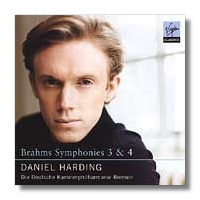
The Internet's Premier Classical Music Source
Related Links
- Brahms Reviews
- Latest Reviews
- More Reviews
-
By Composer
-
Collections
DVD & Blu-ray
Books
Concert Reviews
Articles/Interviews
Software
Audio
Search Amazon
Recommended Links
Site News
 CD Review
CD Review
Johannes Brahms

- Symphony #3 in F Major, Op. 90 (1883)
- Symphony #4 in E minor, Op. 98 (1885)
German Chamber Philharmonic Bremen/Daniel Harding
Virgin Classics 5 45480 2 DDD 73:53
Daniel Harding, a British conductor not yet into his 30s, was named Musical Director of Bremen's German Chamber Philharmonic in 1999. Since then, he has made a handful of controversial recordings with this ensemble and with others. These include a lickety-split Don Giovanni (recorded live at the 1999 Aix Festival) and a disc of Beethoven overtures.
This new Brahms release already has provoked varied opinions. Although this is not an "original instruments" production, some of that movement's ethos pervades this recording. The orchestra is small: in the Third Symphony, Harding uses nine first violins, eight seconds, six violas, five cellos, and three double basses. (In the Fourth, he splurges and adds a ninth second violin.) He seems to encourage timbres consistent with the sound of instruments from the 19th century. Also, Harding's tempos are fast, in keeping with the general belief that tempos generally have been slowing down over the last 150 years.
I don't mean to suggest that Harding is a mere curator. He imposes personality on the music (I hesitate to say "his" personality) left and right. His coy pauses between the opening phrases in the Poco allegretto of the Third Symphony are just one example of how he seems to want to shock listeners into hearing this familiar music with new ears.
Partly because of the composition of the orchestra, but mostly – I think – because of Harding's desire to be provocative, orchestral balances are, if not lopsided, certainly unusual. At times, Harding almost inverts the relationship between themes and accompaniments. These performances bring out inner voices obscured in most other recordings, but they do so by putting a leash on the music's melodic content.
Harding tends to be too literal in the slow movements. Those who see the Poco allegretto of the Third Symphony as an apex of Brahms' romanticism will be reaching for the Viagra after hearing Harding. On the other hand, he can whip up a lot of excitement, even vulgarity, such as in the coda to the Fourth Symphony's opening movement.
In short, these are uneven readings, but rarely less than interesting ones. Traditionalists will have no use for them, but listeners willing to suspend their prejudices for a little while probably will have a good time with Harding and his sinewy, athletic band of Bremeners. The fine sounding studio recordings were made in 2000 and 2001.
Copyright © 2002, Raymond Tuttle


















